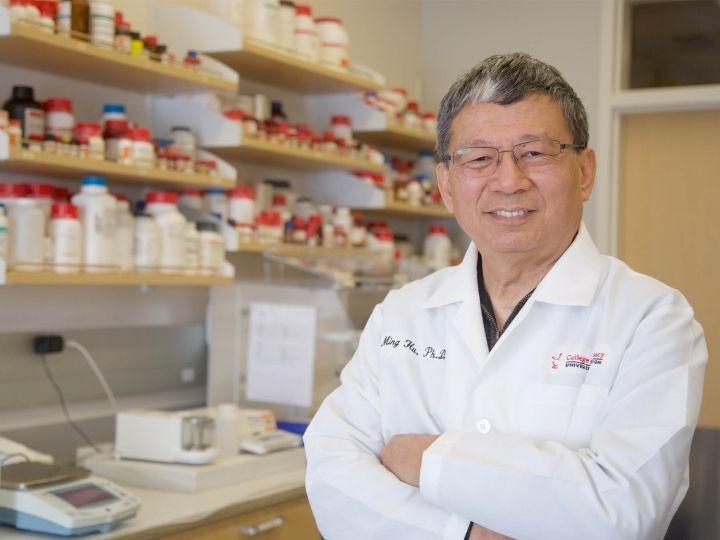Implications for developing treatments for intestinal diseases

Credit: University of Houston
A team of University of Houston pharmaceutical researchers is reporting a newly recognized process of drug metabolism in the intestines – followed by recycling through the liver – that could have important implications for developing treatments for intestinal diseases and for taking multiple medications at the same time.
“The intestines play a crucial role in metabolizing and recycling certain plant compounds and drugs,” reports Ming Hu, Diana S-L. Chow Endowed Professor of Drug Discovery and Development and the senior author of the paper in eLife. “The discovery has important implications for scientists trying to understand how both phytochemicals (a type of plant compound, such as flavonoids) and medicines are metabolized in the body.”
The new information could help chemists develop better drugs and clinicians to fine-tune medication dosing, especially when dealing with polypharmacy, where a patient takes multiple drugs at the same time.
Scientists have long recognized that bile acid is produced in the liver and released into the intestines and is then recycled back through the liver for reuse as the bile. Some medications that are metabolized in the liver also go through this process, known as enterohepatic recycling (EHR). This can extend the life of drugs in the body, which may affect how well they work and whether they cause side effects.
“The liver has long been considered the most important organ for drug metabolism,” said lead author Yifan Tu, who conducted the study while he was doing his doctoral work at the UH College of Pharmacy. “But we’ve shown that the intestines also play a major role in drug metabolism.”
In their experiments, the team administered 16 different types of flavonoids or drugs directly to the liver or intestines and then tracked what happened to the treatments. They found that some drugs and compounds were metabolized in the intestines and the metabolites were then transported to the liver before being cycled back into the intestines.
“In this process, the liver acts only as a recycling organ, which is rare, since the liver is known to be the metabolic ‘superstar’ organ in humans,” said Tu, who is now a postdoctoral fellow at the pharmaceutical company Boehringer Ingelheim in Connecticut.
The team has called this new mechanism ‘hepatic enteric recycling’ (HER). They found that, in this process, the roles of the liver and intestines are reversed. “This may explain why some drugs or plant compounds have larger effects on the intestine than anticipated and could help scientists understand how intestinal diseases may alter drug metabolism in the body,” said Tu.
“We hope our findings will be useful for medicinal chemists to design new drugs tailored to treat intestinal, especially colonic diseases,” said Hu.
###
Media Contact
Laurie Fickman
[email protected]
Original Source
https:/
Related Journal Article
http://dx.




